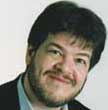
Jeff Jacoby
A just war, with or without WMD
http://www.NewsAndOpinion.com |
So George Bush and Saddam Hussein, it turns out, had something in common: Both were falsely led to believe that Iraq had stockpiles of illicit chemical and biological weapons.
Bush was misled by the CIA and the other intelligence agencies, which had been reporting for years that Saddam's regime was armed with such "weapons of mass destruction." Saddam was deceived by his own military scientists, who kept assuring him — perhaps out of fear of losing their lives if they didn't — that the weapons were being produced.
That, in a nutshell, is the conclusion of David Kay, who resigned this week as chief US weapons investigator in Iraq. When Kay entered the newly-liberated country last spring, he was sure it was only a matter of time before Saddam's unconventional weapons caches were located. "My suspicions are that we'll find in the chemical and biological areas — in fact, I think there may be some surprises coming rather quickly in that area," he said in June. But now, after nearly nine months of searching, his attitude has changed. "My summary view, based on what I've seen," he said on Sunday, "is that we are very unlikely to find large stockpiles of weapons. I don't think they exist."
Not surprisingly, the howling Bush-is-a-liar crowd have seized on Kay's judgment as proof of the nutty claim they have been peddling for months: that the administration knew perfectly well that there was no WMD threat, but falsely claimed there was in order to justify a war that it craved for political reasons.
Thus, Howard Dean allowed as how he "wasn't entirely shocked" by Kay's statement. "They clearly tried to gin up every piece of intelligence to try to get us to go into that war," he told CNN. Robert Scheer, a Los Angeles Times columnist, went even further. "Now can we talk of impeachment?" he wrote on Tuesday, going on to declare that Kay's "admission . . . confirms the fact that the Bush administration is complicit in arguably the greatest scandal in US history."
But there's a problem with pinning such accusations on Kay's words: the rest of Kay's words. Take his exchange with NBC's Tom Brokaw on Monday. It fatally undermines the fantasy that the White House "tried to gin up" a weak case for war.
Brokaw: A lot of the president's political critics are going to say, "This is clear evidence that he lied to the American people."
Kay: Well, Tom, if we do that, I think we're really hurting ourselves. Clearly the intelligence that we went to war on was inaccurate, wrong. . . . I think if anyone was abused by the intelligence, it was the president of the United States rather than the other way around.
Brokaw: The president described Iraq as "a gathering danger." Was that an accurate description?
Kay: I think that's a very accurate description.
He added that "Baghdad was actually becoming more dangerous in the last two years than even we realized" — a point he has made in other interviews, too. In fact, he told NPR that based on what he saw on the ground in Iraq, "I think it was reasonable to reach the conclusion that Iraq posed an imminent threat."
It goes without saying — or it should — that the Bush administration was not alone in worrying about Saddam's WMD. Former Vice President Al Gore, for example, noted during a speech in September 2002: "We know that he has stored secret supplies of biological and chemical weapons throughout his country." Gore was and is highly critical of Bush's foreign policy, but he didn't doubt for a moment that Saddam was equipped with deadly chemical and biological agents. Neither did Bill Clinton, the United Nations, or even Jacques Chirac.
Or, for that matter, the Democrats running for president. John Kerry, who repeatedly accuses Bush of having "misled" the nation, voted to go to war against Saddam. Why? "Because I believe," he said before casting that vote, "that a deadly arsenal of weapons of mass destruction in his hands is a real and grave threat to our security and that of our allies."
Even *Saddam's own military officers* believed there were stockpiles of illegal weapons. In its Page 1 story on Kay's findings, The New York Times noted that while "no Special Republican Guard units had chemical or biological weapons, . . . all of the officers believed that some other Special Republican Guard unit had chemical weapons. 'They all said they didn't have it, but they thought other units had it,' Dr. Kay said."
For those of us who never believed that the case for toppling Saddam depended primarily on his possession of unconventional weapons, the fact that in 2003 he no longer possessed them changes very little. The war was right and proper because Saddam was a homicidal dictator who ruled with staggering brutality, because he provided support to international terrorists, and because Baathist Iraq was a threat to its neighbors.
But above all because of 9/11. What that day's attacks made clear is that we will not have peace until the fascism that grips so much of the Arab Muslim world is confronted, crushed, and transformed into something more decent. Bush understands what his predecessors did not: that the United States must stay on the offensive, pushing back until the theocracy and tyranny that make the Middle East so dangerous are defeated.
Like this writer's work? Why not sign-up for the daily JWR update. It's free. Just click here.
Jeff Jacoby is a Boston Globe columnist. Comment by clicking here.


